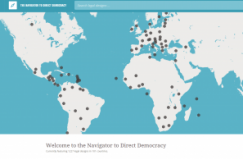At stake are several reforms. At most the question is contested whether the number of the Senate should be reduced to 100 (from the current 315). In the future, Senators would not anymore be elected directly, but nominated based on membership of the regional councils, the mayorship of a number of major municipilaties, or selected by the President of the Republic.
A plebiscite and a referendum
Also, the direct democracy instruments are amended if the majority of voters approve the referendum. Prime Minister Matteo Renzi and the governing majority of Parliament called for the referendum as the constitutional amendment did not have the majority of two-thirds in each house of the Parliament in the second voting. Also the opposition in the Senate voted with the necessary amount of members for a vote of the people.
Additionally, supporters of the plans collected the signatures needed within 3 months. This means a facultative referendum was triggered also.
“Matteo Renzi aims at changing the constitution, which happens for the third time since 1948. We have to speak of a plebiscite, a referendum from the top, as well as a facultative referendum. Similar to other plebiscites, this vote now is closely connected to the person of Renzi. It becomes a vote to approve or discredit Renzi’s politics”, states Dr. Klaus Hofmann, the brain behind the Navigator to Direct Democracy.
In this online-database that comprises all legal instruments of direct democracy in the world, the national level of Italy lists five different tools of direct democracy, see them all here. According to the Italian legislation to change the constitution (Article 138), there is no turnout quorum and the result of the popular vote is legally binding.

The envisaged reforms of citizen participation and direct democracy would leave the frequently used instrument of abrogative referendum largely intact, while a change would be introduced: In case of 800.000 signatures, the quorum will be 50% of the latest electoral turnout-out.
“This modification is highly ambivalent in view of how to judge it in terms of an advance for direct democracy. Currently, the Italian referendum law demands just 500.000 signatures but 50 per cent of the overall electorate has to turn out. Hence, there is a progress and a backlash at the same time”, so Dr. Hofmann.
The referendum is widely echoed in the international media. This is because in January 2016, Renzi had announced to resign as Prime Minister in case his reforms are rejected. Since then Renzi has not repeated this claim. In Italy, opinion polls are banned in the last two weeks of campaigning. Hence without any predictions close to the date of the vote, it becomes more exciting to see what is going to happen in Italy after 4 December 2016.
Check out the Navigator to Direct Democracy to learn about the legal instruments of direct democracy available in Italy.
Text by Cora Pfafferott
Credit of Image with Matteo Renzi: "Presidenza della Repubblica", see source here.


